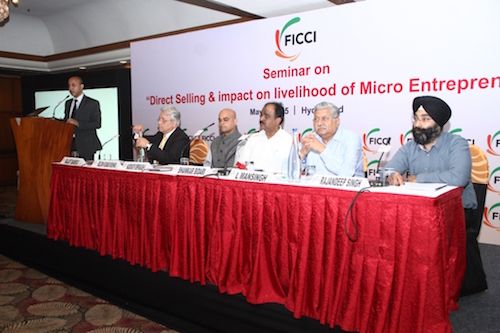Call for Clarity

THE BIG NEWS
India must grant the Direct Selling Industry a separate legislation in order to tap its huge development potential.
The saga of Direct Selling Industry in India has been growing manifold over the years and the sector promises astounding growth in the future too. In the age where people want everything at their footstep, Direct Selling holds immense promise, comfort and convenience. According to the Federation of Indian Chamber of Commerce and Industry (FICCI), India’s Direct Selling Industry has the potential to reach a size of Rs 64,500 crore by 2025 and will engage 18 million Direct Sellers by then. As per the same report, South India is emerging as the biggest Direct Selling market in the country.
In a seminar on Direct Selling and the impact on the livelihood of micro entrepreneurs organized by FICCI in Hyderabad on May 4, Rajat Banerji, chairman, FICCI Direct Selling Committee, said, “In less than two decades, it (Direct Selling) has provided self-employment opportunities to more than 50 lakh people in India as Direct Sellers. The Industry holds huge potential not only for the economic development, but also social development of the country. With the growth in the industry, it is projected to employ nearly 1.8 crore Direct Sellers by 2025,” Mr Banerji said. He called Direct Selling one of the oldest forms of sale in the world and emphasized that the main aim of this mode of distribution is not only selling but to also create micro-entrepreneurs. The sector has the potential to engage over 10 million women as Direct Sellers by 2025. Its contribution to the government revenue is expected to increase ninefold to Rs 9,000 crore by 2025. Unfortunately, a sector of such a mammoth potential lacks the clarity in regulatory mechanism.
Bejon Kumar Misra, International Consumer Policy Expert & Founder of Consumer Online Foundation, present in the seminar, said, “There is a dire need to facilitate clear understanding of the concept to make an impact on lives of micro entrepreneurs.” He was happy that now there was an explicit demand from the Industry for a separate legislation for the Industry. “This is the first time someone is asking for a policy or guidelines because there is no clarity on what Direct Selling is. Everyone is interpreting it in his own way. To clear the confusion and distinguish it with Ponzi and chit fund schemes, a set of guidelines should be made by recommending an immediate amendment to the governing legislation,” he emphasised.
Notably, the Centre has constituted an inter-ministerial committee to study the problems being faced by the Direct Selling Industry. However, there has not been much headway in the first meeting of the committee. “Under these circumstances, the stakeholders should focus on guidelines and create awareness among the state governments,” said former Union Consumer Affairs Secretary L Mansingh. Shankar Bidari, former Karnataka Director-General of Police dwelled on the idea of the Direct Selling entrepreneurs making their business process impeccable in the absence of government regulations. Exhorting them to make their business process public, particularly the commission structure, he said, “Such disclosure would act as a shield for the sector, which was facing cases under the Prize Chits & Money Circulation Schemes (Banning) Act, 1978.”
According to these experts, Direct Selling is one of the fastest growing non-store retail formats in India, recording double digit growth of more than 20 per cent over the past five years. According to the Indian Direct Selling Association (IDSA) report, the Direct Selling Industry in India has touched a size of about Rs 7,472 crore in FY 2013-14. “Globally, the sector offered self-employment opportunities to 43.8 million Direct Sellers in 2001, which stood at 96.3 million in 2013.” Nearly 43 per cent of market share of global Direct Selling industry is held by Asia-Pacific markets in 2013 at $ 77,569 million recording a growth rate of 12.6 per cent, the report added. The Direct Selling Industry generates direct employment through manufacturing and other services involved throughout its value chain. The entry of multinational companies (MNCs) has ushered significant development in the SME sector by facilitating state-of-the-art technologies and knowhow to them.
Copyright © IDSA 2018 All Right Reserved.
Design & Developed by : It Info Technologies Pvt. Ltd

